
What is A Level?
If you are wondering what is A level, it is one of the most recognised pre-university pathways in the world,
Learn how to write step-by-step answers, and score A* in your exam!

Announcement: Cambridge IGCSE, O Level and AS & A Level June 2025 past papers are now available.
The marking and grading process of exam papers by Cambridge International Examinations (CIE) is a meticulous and standardized procedure designed to ensure fairness, accuracy, and consistency in evaluating student performance.
This guide provides an overview of how exam papers are assessed, from initial marking by examiners to the final grading decisions that determine students’ results. By understanding the key principles and methods employed by CIE, educators, students, and stakeholders can gain insight into how marks are awarded and grades are determined, ensuring confidence in the reliability of the examination system.
*If the video isn’t playing for you, please read below.
Most of the exam scripts are scanned and marked by the examiners on their computers. Other exam scripts are marked manually on paper. For the multiple-choice component, the computer automatically marks the papers.
Cambridge examiners are composed of teachers and subject experts. Their task is to mark the exam scripts at the same standard. This means all the examiners mark according to the mark scheme and they all apply the mark scheme in the same way.
A team of experienced senior examiners mark a sample set of exam scripts based on the mark scheme. They then agree to the marks. These same exam scripts set the standard and will be used by the other examiners to practice marking. This is to make sure that all examiners understand how to mark the same way. For the final part of calibration, they mark another set of scripts as a test. They then begin to start marking all other papers.
The senior examiners review all the markings of every examiner. This is to ensure that they are all marked correctly. If an examiner fails to mark consistently, another examiner remarks the scripts.
CIE uses grade boundaries to convert marks into grades. The grade boundaries are the minimum mark needed to achieve a grade. It considers statistical evidence and expert judgment to agree to grade boundary. It also accounts the slight difference in the level of difficulty every year.
When the grade boundaries are set, it is applied to marks for grading. The senior examiners carry out final checks on the markings and the results are then sent to the schools.
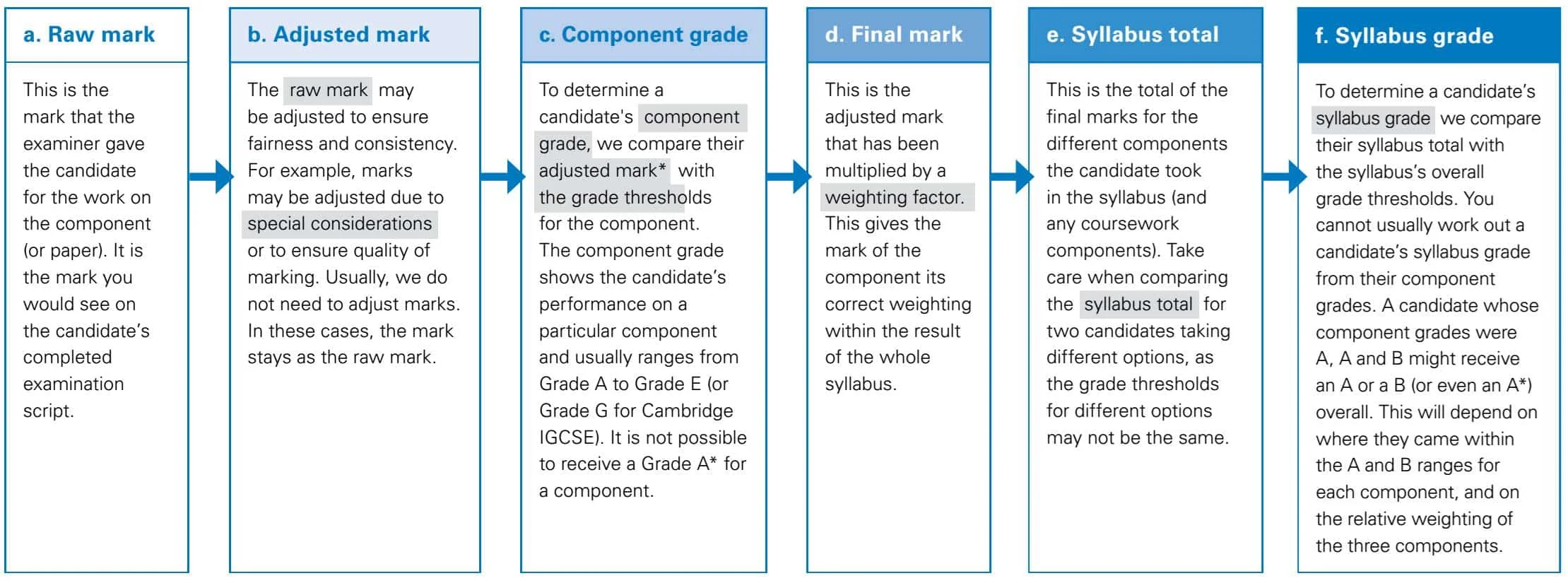
The raw mark is the sum of all the total marks achieved in that component.
The mark found on the candidate’s completed examination script is the raw mark. For example in Syllabus 0620, the candidate’s raw mark in Component 41 is 20 out of the 80 total marks available.
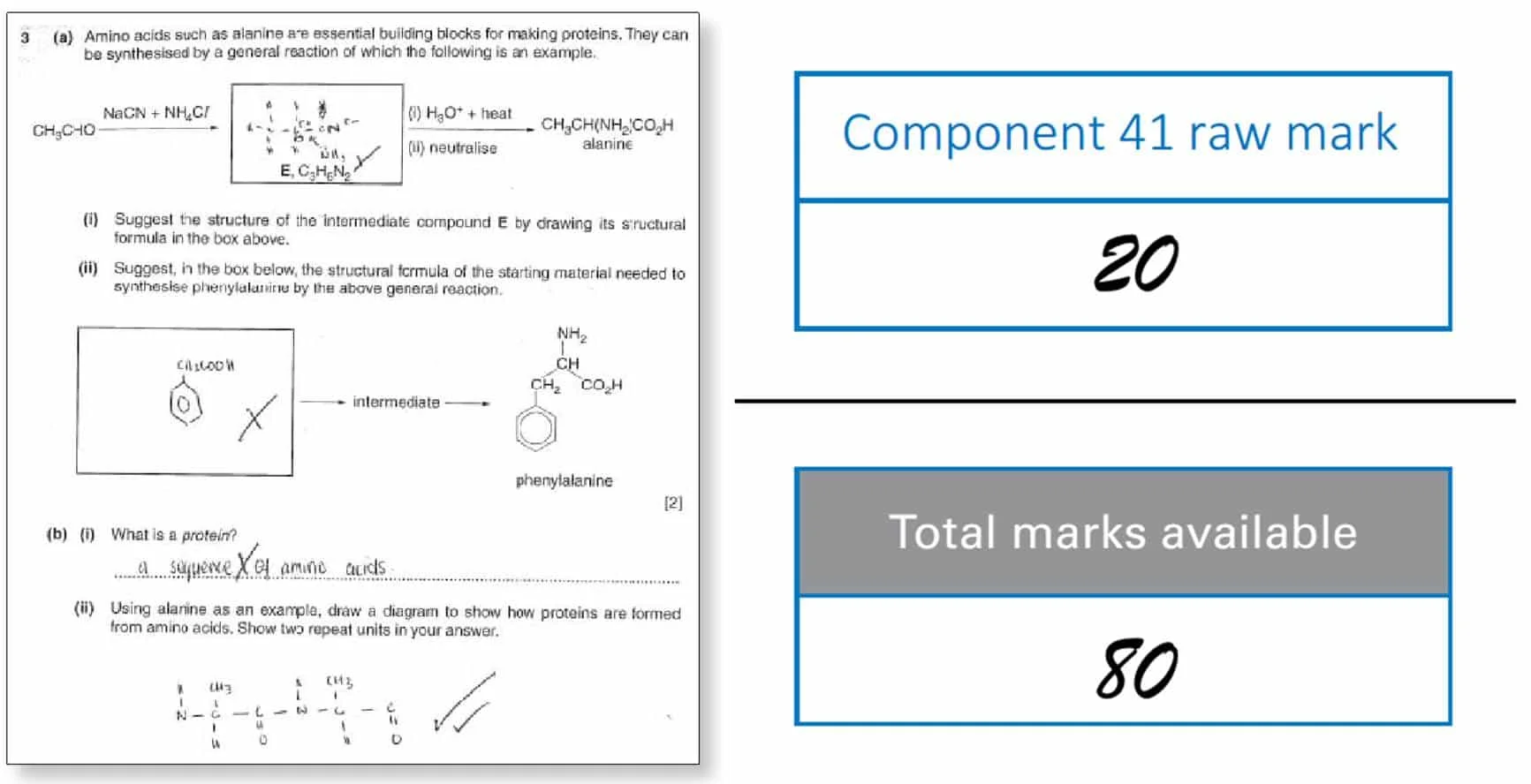
Raw marks are adjusted to ensure fairness and equality. It can be adjusted due to scaling, granting of special consideration or both. Scaling is applied to ensure consistency across the marking process and the different examiners. Special consideration is granted if CIE agrees to an earlier formal request from a Centre. Usually, there is no need to adjust marks and the mark stays as a raw mark.
For example, the candidate’s component 41 raw mark of 20 is adjusted to 21 to reflect the fairness and consistency of marking between examiners.

Compare the component’s raw mark with the component’s grade thresholds. The component grade can be found on the subject syllabus? Grade Threshold.
For example, the candidate’s component 41 adjusted mark is 21, its component grade falls under the grade D threshold.
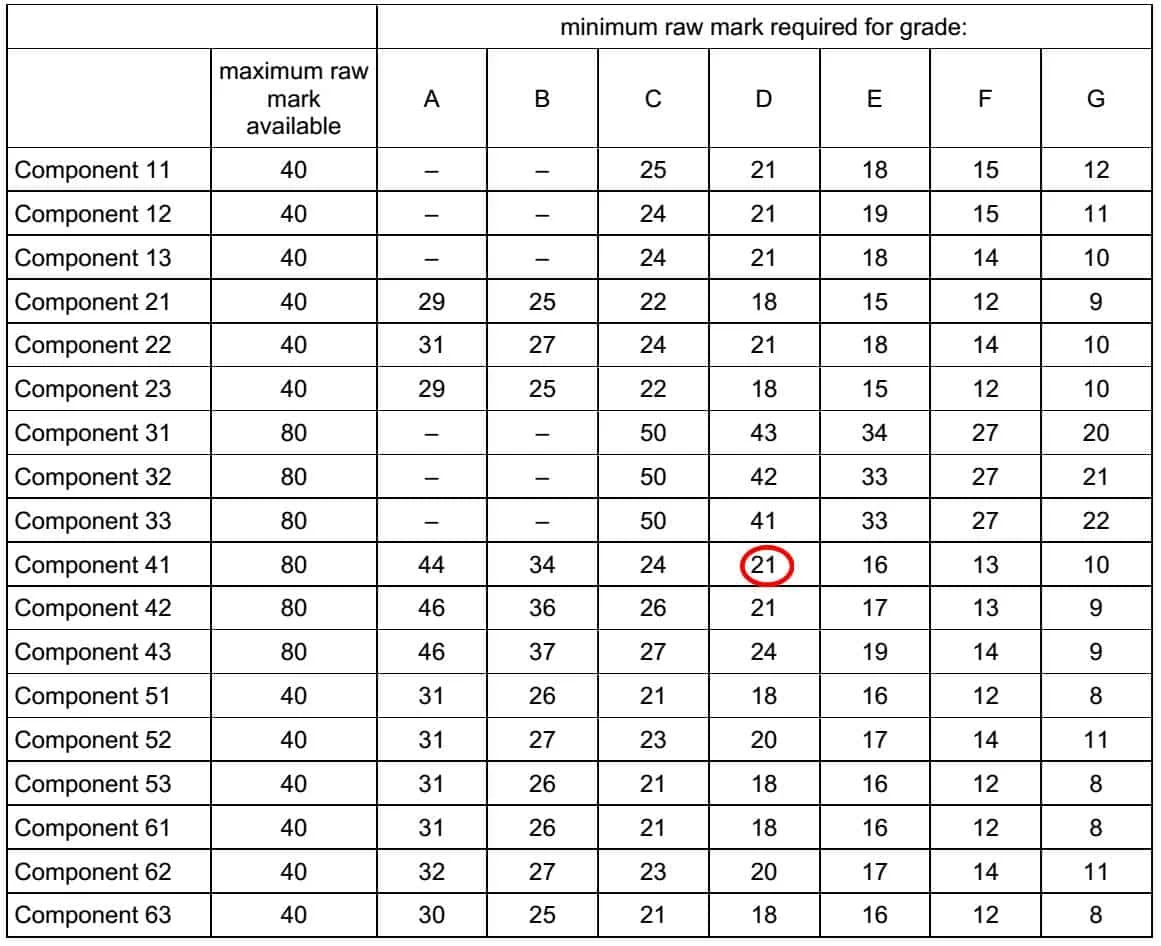
Calculate the final mark by multiplying each component’s mark by its weighting
factor. Weighting factor is the value assigned by CIE to indicate the level of importance of each component. The component weighting factors can be found here.
Calculate the syllabus total by adding all final marks together. Round up syllabus totals that end in 0.5 to the nearest whole number.
For example, the candidate’s component 41 adjusted mark (21) is multiplied by the component’s weighing factor which in this case is 1.25. This will lead to the candidate’s component 41 final mark of 21 x 1.25 = 26.25.
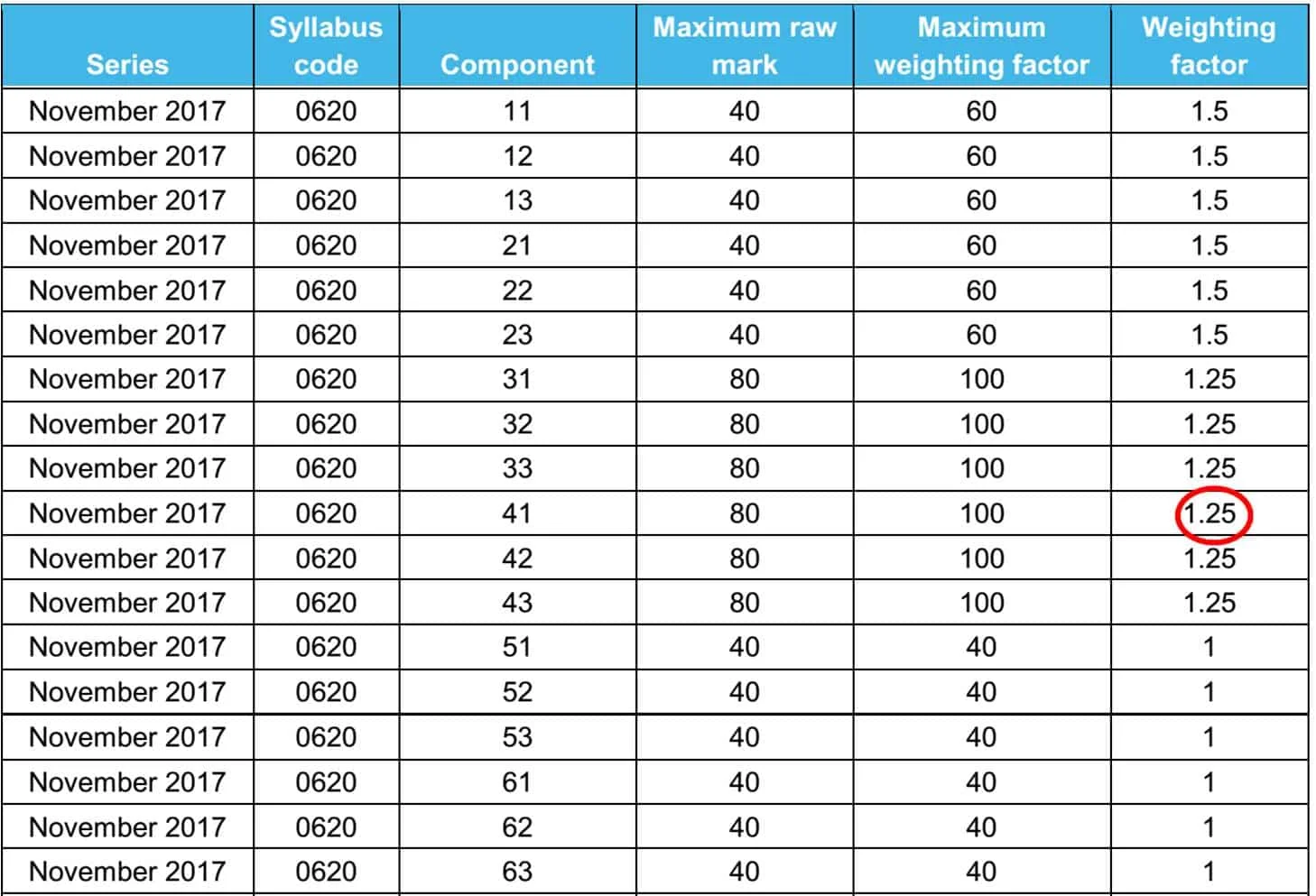

Consequently, when all the component’s final mark is computed, the candidate’s syllabus total can be calculated by adding it. For example, the candidate?s final marks for each component are 28.5, 26.25 and 20 for Components 21, 41 and 61 respectively. The sum of all of these component marks totals to 74.75. It is then rounded off to the nearest whole number that is 75.

Compare the syllabus total to the overall grade threshold. Make sure that the option code is correct. As the grade thresholds for different options may not be the same.
For example, if the candidate took the combination of Components 21, 41, and 61, the syllabus grade should be compared to Option CX grade threshold. As such if the candidate’s syllabus total is 75, it falls under the Grade D threshold because Grade D threshold are for 71 marks and above. The Grade C threshold is for marks that are 84 and above.
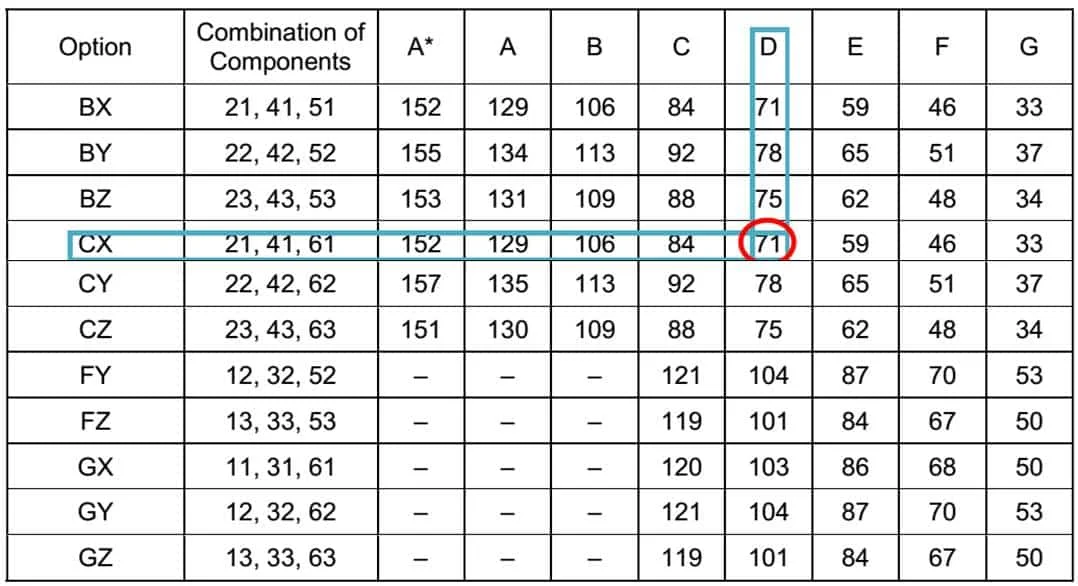
* All info taken from CIE. The above video is made by CIE.
Join 62,169 (and counting) IGCSE & AS/A Level subscribers who’ve taken our insanely valuable FREE email courses. Learn exam tips & score A* in your exam!
Hani
Hani
Daniel
Daniel
Naida Sofea
Naida Sofea
Matthew Dai
Matthew Dai
JD
JD
Bazish khan
Bazish khan
Ibraheem
Ibraheem
Liana Lytras
Cyprus
Liana Lytras
Cyprus
Akshit Philip
Bahrain
Akshit Philip
Bahrain
Madina
Kuwai
Madina
Kuwai

If you are wondering what is A level, it is one of the most recognised pre-university pathways in the world,
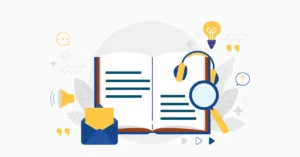
Preparing for your IGCSE English as a Second Language (ESL) exam can feel daunting. You are not just learning grammar

Choosing the right educational pathway for your child is one of the most significant decisions a family can make. In

The IGCSE English First Language exam places a strong emphasis on creative writing, with writing descriptive and narrative essays being
130 responses
Thanks for your response. My actual question was how did they calculate my grade when I took only 3 papers for both subjects? Which of the options did they use for 11,21 and 41? Thanks
Hi Frank,
The option they used to calculate your grade is the entry code you used when registering for the exam. Therefore, if you missed any paper/components, it will affect your overall syllabus grade.
We hope this helps. Thank you.
Please I want to know the grade boundaries for A Level Biology and Chemistry. I took the June 2021 exams, 11, 21, 41 for both subjects.
Hi Frank,
You can check the grade boundaries for each subject by downloading the grade thresholds here: https://www.skolatis.com/as-a-level-past-exam-papers/. Our Cambridge A Level past papers drive is updated up to June 2021 exam series.
We hope this helps!